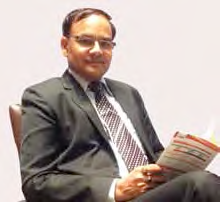
 Prem Narayan,
Prem Narayan,
Director (JnNURM), Ministry of Urban Development, Government of India
The concept of smart city emphasises the idea that information technology and digital data can be used to make a city more efficient. We can keep adding value to our cities through centralised energy production, self-sufficient blocks with solar roofs, mixed usage, district heating, waste recycling, electric cars and electric bikes.
Openness is the key for any smart city. A state of the art communication and information sharing system lies at the core of the smart city. Through such system there is collaboration between the inhabitants, businesses, knowledge institutions and government departments. Smart city should have energy efficient solutions for street parking, traffic monitoring, waste management, environmental control, public lighting, public spaces use and public safety.
Essentials of smart city
Services – Inhabitants in the smart city need access to hospitals, schools, sports halls, city hall for administration, police stations, museum, shops, law courts and much else.

Multi-model Transport System – There should be seamless system of multi-model public transport system that includes tramways, roads, pathways for cyclists, pathways for pedestrians, etc. Such infrastructure needs to be backed by strong road signalling system so as to ensure smooth and congestion free travel of citizens. In the densely populated cites, the most popular means of transportation is bus; buses should be powered by natural gas in order to safeguard the environment.
Use of Sensor Technology – A smart city can create an efficient and smart services delivery platform for citizens and municipal workers by installing sensors in the city and creating platforms that allow seamless sharing of information by citizens, city managers, businesses and professionals. The platform can have common data warehouse where different sensor systems store their information.

Waste to energy Treatment Plant – Wind, water and the sun are well known sources of sustainable energy. Biomass can also be a source of sustainable energy. The waste that the city generates can be a source of energy. The waste that cannot be recycled to produce raw material can be incinerated. This process will lead to production of energy, heat and raw materials.
Bio-climatic Principles – By applying bioclimatic principles in architectural design we can design buildings that are more efficient in use of power. Such buildings can make use of outside climatic conditions to maintain a comfortable living environment. Thus the use of fossil fuels is minimised and that of renewable energy sources, such as solar, wind, water or geothermal energy is maximised.
Remote control network – A Smart City must have an integrated control network for common data transmission infrastructure, which can monitor the municipal and supply networks. Such a system will generate real time information on the various issues that are in the network. The service network should include supply network, drainage network, rainwater network, public lighting, pneumatic waste collection, climatology, electrical energy and internal home comfort.
Information & communication Technology– Information & communication Technology (ICT) improves the way cities function and there is exchange of information so that people can make informed decisions. ICTs can lead to cities becoming more participative way and facilitates active participation of individuals and local communities as well as provides efficient feedback system and improves internal and external interaction. It creates an urban commons for cities collaborations around the world.
Smart Mobility – It is extremely important to ensure availability of open public data for analysis and onward distribution by users. It is in the interests of the city to ensure that people have access to good telecom network. Sharing of available resources as well as parking solutions in the city ensures use of resources in a smarter way. A better telecom network and systems is also necessary for improving the general quality of life in the city.
Be a part of Elets Collaborative Initiatives. Join Us for Upcoming Events and explore business opportunities. Like us on Facebook , connect with us on LinkedIn and follow us on Twitter, Instagram.











